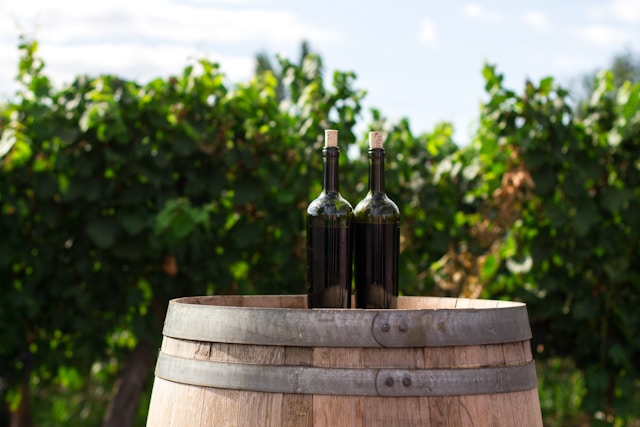Today, many wine enthusiasts care not only about the taste of the wine in their glass but also about whether it is produced using sustainable farming methods. Throughout California, winemakers are responding to climate change by increasingly adopting biodynamic and organic viticulture.
Sponsor – https://fusemonterey.com/
Alpen Cellars
Even with sustainable farming practices, modern winemakers face challenges in keeping their carbon footprint low due to the electricity required for equipment. However, the family-run Alpen Cellars, located in the Trinity Lakes AVA and covering over 1.2 square kilometers, has been independent of the grid since its founding in 1984. The entirely renewable energy-powered winery is known for Austrian grape varieties like Blaufränkisch, Riesling, Gewürztraminer, as well as Chardonnay, Merlot, and Pinot Noir.
Frey Wine
While most winemakers in Mendocino County now use organic grapes, Frey Wine was ahead of its time, being the country’s first organic winery over 30 years ago. Frey was also the first to produce biodynamic wines in the region.
Shannon Family of Wines
Located in Lake County, the Shannon Family of Wines is one of the largest certified organic wineries in the country. This summer, the winery received the California Green Medal Environment Award, given to the winery that demonstrates the greatest benefit to the environment through sustainable practices.
Wise Villa Winery
Wise Villa Winery in Placer County was one of the first wineries to implement a worm-driven wastewater treatment system from BioFiltro, which cleans wastewater from the winemaking process so it can be used in drip irrigation systems. The winery also employs a natural approach to weed, animal, and insect control in the vineyard.
Sonoma County
As one of California’s most famous wine regions, Sonoma County has taken a leading position in sustainability, with 99% of vineyards certified as sustainable. Silver Oaks Cellars in Sonoma was the first commercial winery to receive the prestigious LEED Platinum certification, while Anaba Wines was the first winery in Northern California to switch to wind energy. Many wineries in the region protect land for wildlife, including Jordan Winery & Estate, which was named the largest pollinator protection area among wineries in 2021, Medlock Ames Winery, which provides a wildlife corridor to Pepperwood Reserve, and Lasseter Family Winery, which has developed a natural ecosystem on-site.
Casto Oaks
Casto Oaks Winery, located in the Sierra Nevada foothills just a stone’s throw from Yosemite National Park, employs a variety of sustainable farming methods to produce intense Zinfandels and Bordeaux varieties. The vines are still hand-tended, and the same farming methods are applied each year, giving Casto Oaks wine its intense fruitiness, acidity, and deep color.
E&J Gallo Winery
The legendary E&J Gallo Winery in Fresno has been committed to environmental protection since the 1930s when the founders initiated the ‘50/50 Giveback Plan.’ Under this policy, for every hectare of vineyard land, another hectare is reserved for wildlife habitat. In 2016, its Dry Creek Building received Gold LEED certification.
Chamisal
Located in the Edna Valley, a wine region with the longest growing season in the state, Chamisal was the first winery to grow grapes in this fertile area. It was also the first SIP-certified winery, a stringent sustainability award in the wine industry.
Scheid Family Wines
With over 16 square kilometers of sustainably certified vineyards in the Salinas Valley of Monterey County, environmental stewardship has been a focus for Scheid Family Wines since its founding in 1972. Since 2017, the winery and bottling facility have been powered by 100% renewable wind energy generated by a 120-meter wind turbine, which produces enough energy for the winery and 125 homes in the local community.
Ponte Winery
Located in the Inland Empire, Ponte Winery was the first winery in Temecula Wine Country to receive the Certified California Sustainable Winegrower (CCSW) designation. Ponte also uses natural methods for pest control and employs strategies to reduce waste production, lower energy and water consumption, and package with recyclable materials.
Angeleno Wine Co.
While Los Angeles is not known for its wine production, Angeleno Wine Co. opened in downtown L.A. in 2019 as the city’s first winery. Its wines are 100% vegan, naturally processed, and hand-bottled on-site. The grapes come from nearby family vineyards where organic and sustainable viticulture is practiced.
Ramona Ranch Vineyard and Winery
In 2017, Ramona Ranch Vineyard and Winery became the first winery in San Diego County to be recognized by the California Sustainable Winegrowing Alliance (CSWA) as “Certified California Sustainable Winegrowing.” The winery adopts a natural approach to pest control, preserves natural habitats, and utilizes solar and wind energy to power its operations.
